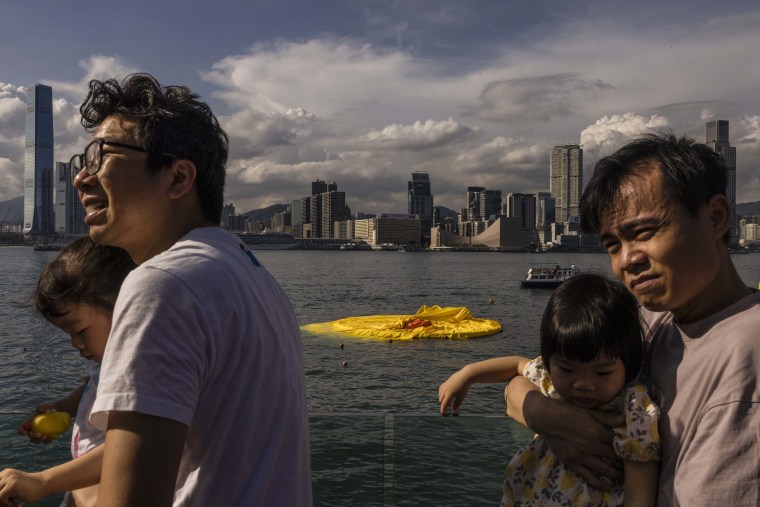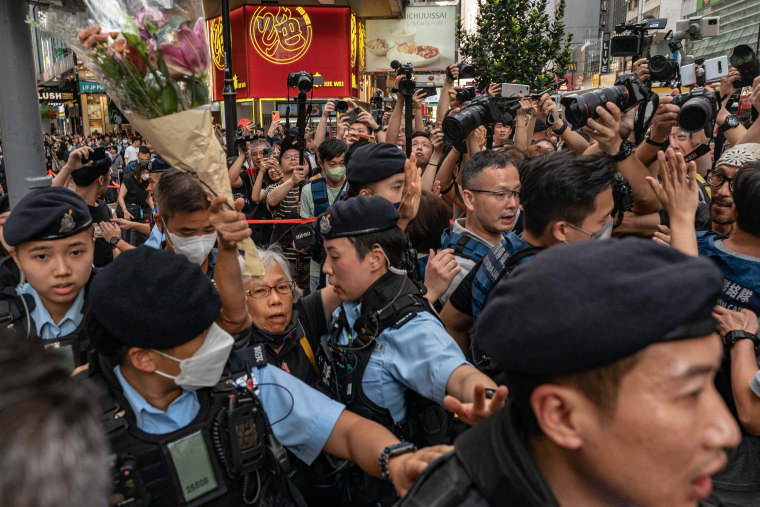HONG KONG — A pair of giant yellow ducks sailed into Hong Kong in early June, brightening its famous Victoria Harbor — only for one of them to deflate.
The double duck art installation came 10 years after an original solo duck, by Dutch artist Florentijn Hofman, appeared in the harbor as part of a global tour. But the Chinese territory is not the same place it was a decade ago, having been transformed by two major protest movements, three years of pandemic isolation and a national security law imposed by Beijing.
“I do think that having these two ducks here helps lift Hong Kongers’ spirits,” said Wendy Chan, one of the local residents who flocked to the waterfront before the ducks — one of which had to be briefly deflated amid scorching heat — were removed early due to what the organizer told local media were high costs and operational challenges.
The installation is about friendship and connection, Hofman said in a news release, and is “not about looking into the past but enjoying the moment together!”
It's a philosophy the Hong Kong government is eager to embrace as it focuses on strengthening the economy and repairing the international financial hub’s battered image.
As part of that effort, it recently launched a “Happy Hong Kong” campaign featuring food fairs, prize draws and, starting Saturday, a shopping festival that includes 100,000 free cups of coffee from Starbucks, all aimed at “bringing more joy to the community.”
Not everyone is in the mood.
Things have been different in Hong Kong since June 30, 2020, when Beijing imposed the national security law in response to anti-government protests that roiled the city for months the previous year, sometimes turning violent.

More than 250 people have been arrested under the legislation, including 47 pro-democracy politicians and activists who have mostly been held without bail for more than two years.
Authorities say the law, which criminalizes secession, subversion, terrorism and collusion with foreign forces and is punishable by life in prison, was necessary to restore stability.
The government crackdown has sent Hong Kong, long considered one of the freest societies in Asia, plummeting in rankings such as the New Zealand-based Human Rights Measurement Initiative, which said last week that the city had fallen 33% on its freedom of expression index since 2019.
Happiness is also falling, with families reporting an average score of 6.57 out of 10 compared with 7.26 in 2021, The South China Morning Post reported Wednesday, citing a recent poll by the Hong Kong Family Happiness Index, by the nonprofit group HK.WeCARE. The poll of 1,356 people also found the biggest drop was among people ages 19 to 24, whose score fell to 6.09 from 6.91 in 2022.
There is a feeling of dejection among Hong Kong residents because “they’re used to having certain things and it’s been taken away,” said Kevin Yam, a Hong Kong lawyer and democracy activist who lives in Australia.
“A ‘Happy Hong Kong’ campaign should be one where Hong Kong is reversing course and gets some of its freedoms back,” he said.
Government authorities strongly object to such criticism, saying Hong Kong is governed by the rule of law.
In a speech on Saturday marking the 26th anniversary of Hong Kong’s return to Chinese sovereignty, Chief Executive John Lee, the city’s top leader, said Hong Kong was quickly returning to normalcy and that he was focused on pragmatic efforts and delivering results.
Lee, who has been in office for one year, said his government would “strive to gain trust through action, narrow gaps with results, and build mutual trust through achievements, in a bid to unite all sectors of the community.”
While Hong Kong is now “largely stable,” Lee said, “we know that we are intentionally targeted and oppressed by some countries” that have misjudged China’s “peaceful development.”
He called for continued vigilance against “destructive forces using ‘soft resistance’” still lurking in the city.
Irrevocable change
It was only in March that Hong Kong lifted the last of “zero-Covid” restrictions that had cut it off from the world, allowing residents to venture outside without masks for the first time in more than 1,000 days.
The city has quickly shown signs of revival: Last Thursday, a public holiday, Hong Kong’s iconic Dragon Boat festival races were held normally for the first time since before the pandemic.
The economy grew 2.7% in the first quarter of this year, after four consecutive quarters of contraction. Finance Secretary Paul Chan said Thursday that business activity in the catering sector and the value of Hong Kong’s retail sales had both returned to about 90% of their levels before the pandemic.
Tourists are also returning, even as airlines struggle to restore flights they had slashed.
“I think Hong Kong is coming back after three years of Covid,” said Tony Chan, a tourist from France whose family is originally from Hong Kong. “I see a lot of mainland China coming back, which is good news.”
Even as the “old” Hong Kong comes back in some ways, in others it is changing irrevocably.
Last week, the Hong Kong Public Opinion Research Institute, a polling organization, said it would cancel about a quarter of its regular survey questions and refrain from publishing the results from some others, including questions about the 1989 Tiananmen Square crackdown on pro-democracy demonstrators in Beijing, citing “suggestions” from the government.
The Hong Kong Police Force declined to comment on the institute’s decision, saying residents can enjoy the rights and freedoms guaranteed under Hong Kong’s mini-constitution “as long as they are not in violation of the law.”
The June 4 anniversary of the Tiananmen crackdown, which Hong Kong marked for more than 30 years with a candlelight vigil that drew tens of thousands of people, was once again a subdued affair last month as police came out in force. Victoria Park, where the annual vigils had been held, was occupied instead by a carnival organized by pro-Beijing groups, and for the second year in a row, the local Catholic diocese did not hold a memorial Mass.
Government officials have not said whether it is still legal to peacefully commemorate the anniversary of the crackdown, saying only that everyone must follow the law.

In the weeks leading up to the anniversary, Hong Kong journalists discovered that dozens of books and documentaries on politically sensitive topics, including the Tiananmen crackdown, had been pulled from public libraries.
Chief Executive Lee said libraries had a responsibility to remove books that might violate the law or spread “messages that are not in the interest of Hong Kong,” and that if people really wanted to read them they could buy them in stores.
And two days after the Tiananmen anniversary, the Hong Kong government said it was seeking a court injunction against anyone performing or disseminating “Glory to Hong Kong,” a song from the 2019 protests that contains a slogan authorities say calls for secession from China.
Officials in Hong Kong, which has never had its own national anthem, have reacted angrily in recent months after “Glory to Hong Kong” was mistakenly played at multiple international sporting events instead of the Chinese national anthem, “March of the Volunteers.” They also pressured Google unsuccessfully to alter its search results for Hong Kong’s national anthem so that “Glory to Hong Kong” doesn’t rank so highly.
Google did not respond to a request for comment.
Speaking to reporters about the injunction June 13, Lee said the song was “not compatible with the national interest” and that the government had a duty to “proactively and also preventively” safeguard national security.
Within a day of the government’s announcement, versions of “Glory to Hong Kong” took up the top 10 spots on Hong Kong’s iTunes chart. The song disappeared from music streaming platforms such as Spotify, which said it had been pulled by the distributor, before reappearing last week.
The song’s creator and distributor, DGX Music, said “2023 editions” of various versions of the song had been newly uploaded on major platforms.
“I firmly oppose any attempt to curb freedom of thought and speech,” it said in a Facebook post June 20, vowing to defend the “freedom to choose music.”